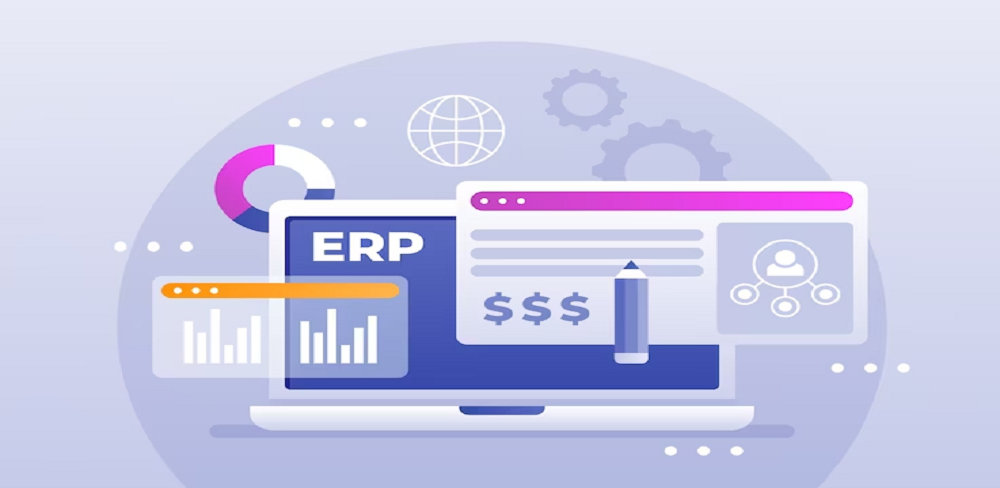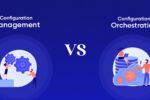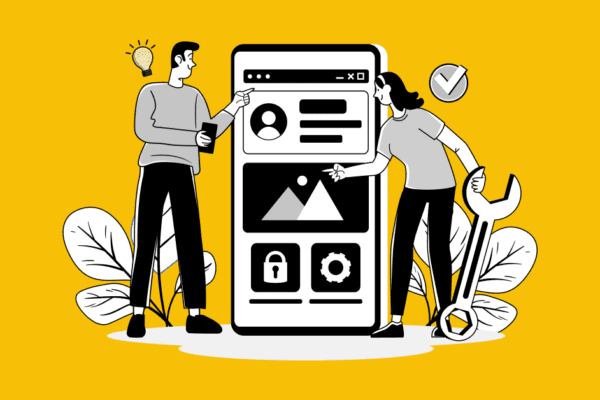Hello There!!
Do you want to know the difference between CRM vs ERP? Then keep reading this blog.
Enterprise resource planning (ERP) and customer relationship management (CRM) are two solutions for businesses aiming to streamline and enhance their company operations. Both are business software programs that connect data from several departments and streamline laborious, manual processes. They are not interchangeable; each has a unique function even if they share some benefits and features.
Customer relationship management (CRM) systems assist and link front-office business operations including marketing, sales, advertising, and customer care. On the other side, back-office processes like finance, supply chain management, and human resources are supported and connected largely by ERP systems.
Discover what are the advantages of CRM and ERP, how they vary, and whether one or both are appropriate for your business.
What is CRM?

CRM is a technology that aids in managing all of your company’s interactions with current and future customers. It’s simple: To grow your business, you need to improve business relationships. A CRM system enables businesses to communicate with customers, optimize operations, and boost profitability.
Salesforce research shows that CRM software can boost sales by up to 29%, while also improving forecasting accuracy and sales productivity by as much as 39%. Better business outcomes are the result.
When people refer to CRM, they usually mean a CRM system. This is a tool that helps with contact management and sales management. It also improves agent productivity. CRM tools are now used to manage relationships with customers across the customer lifecycle – marketing, sales, and digital commerce.
What is ERP?
ERP is a type of software that aids businesses in managing their everyday operations, including compliance, accounting, procurement, project, and risk management, and supply chain management. Enterprise performance management (EPM), a component of ERP software packages, aids in planning, budgeting, forecasting, and reporting financial outcomes for an organization.
In a report by 2020, 93% of organizations rated their ERP projects successful. After ERP implementation, companies reported that 49% had improved their business processes.
Data may go back and forth between various company processes thanks to ERP systems. By gathering shared transactional data from several sources, ERP systems minimize data duplication. They also provide data integrity through a single point of truth. The operation of thousands of businesses, regardless of size or industry, depends on ERP systems. These companies depend on ERP systems just as much as they do on energy.
CRM vs ERP-Advantages
Advantages of CRM
- CRM improves customer relationships: Businesses can build and maintain better relationships with customers. It is a central database that contains all information about the customer, including contact details, purchases, communication histories, and preferences. A comprehensive view of customers allows businesses to better understand customer needs, personalize interactions and deliver superior customer experiences.
- Customer satisfaction is improved: Businesses can offer a more targeted and personalized service by leveraging data from CRM. Reps are able to access information about customers quickly, better understand previous interactions and respond more effectively. It leads to faster response times, more customized solutions, and higher levels of customer satisfaction.
- Increased sales and revenue: CRM systems can help businesses increase sales and revenue by streamlining their sales processes. Sales teams are able to track leads more efficiently, manage opportunities and monitor the pipeline. Customers’ information is available to sales personnel, who may use it to spot upselling and cross-selling possibilities and modify their sales approach as necessary. Higher conversion rates, more sales, and better income creation are the results.
- Enhanced marketing campaigns: CRM systems can be used to enhance marketing campaigns. They provide businesses with valuable insights into customer preferences and behavior, which allows them to develop more targeted campaigns. Marketing teams can segment their customers based on data from past purchases, interactions, and demographics. They can then send personalized offers and messages to them. Businesses may optimize their marketing initiatives and raise client engagement with this focused strategy.
- CRM software improves internal collaboration: It encourages communication and collaboration between different departments within an organization. Employees in the departments of sales, marketing and customer service can share information and update customer data. They can also exchange notes and activities. This allows for a more coordinated customer interaction, reduces the need to duplicate efforts and ensures consistency of messaging across all touchpoints.
Advantages of ERP
- ERP streamlines and integrates business processes: It integrates different business functions and departments into a single system. It consolidates data in different areas, such as finance and human resources, inventory, supply chain management, manufacturing, sales, and more. This integration reduces duplication of data, increases data accuracy, and ensures all departments have the most up-to-date information. This integration also streamlines workflows and allows for smooth communication and collaboration between departments, leading ultimately to improved operational efficiency.
- Improved productivity and efficiency: ERP improves productivity and efficiency by automating and standardizing business processes and reducing paperwork and manual tasks. Routine and time-consuming chores may be eliminated by automating workflows, producing reports, and exchanging information. It increases productivity, allowing employees to concentrate on tasks that add value, like decision-making, customer service, and analysis. Employees can make better decisions faster with accurate data in real-time.
- Enhanced data visibility and reporting: ERP systems offer a comprehensive view of business operations and data. They generate real-time dashboards, reports, and analytics that let management follow important performance indicators, keep tabs on the development, and make informed choices. Accurate and current information is available across the organization, which improves transparency and accountability. It also facilitates proactive management.
- Customer service and satisfaction are improved: ERP systems allow businesses to improve their customer service through a 360° view of interactions, preferences, and order histories. These data enable customer service representatives to respond quickly and effectively to inquiries from customers, offer personalized support, and resolve issues in a timely fashion. Businesses may increase customer loyalty and happiness by providing better service.
- Inventory and supply chain management: ERP systems have modules that manage inventory and supply chains. They can provide real-time information about inventory levels and stock movements. They also automate replenishment procedures. It helps companies optimize their inventory levels, cut costs, avoid stockouts and fulfill orders on time. ERP facilitates supplier management by allowing businesses to monitor suppliers’ performance, negotiate better contracts and maintain a reliable chain.
CRM vs ERP-Disadvantages
Disadvantages of CRM
- Cost and complexity: Implementing a CRM can be an expensive investment, particularly for small and mid-sized companies. Upfront costs include hardware infrastructure, software licenses, and customization, as well as training, maintenance, and ongoing support. The complexity of CRM systems may also pose a challenge during implementation. This requires dedicated resources and expertise in order to configure and set up the system according to business needs.
- Adoption by users: The success and effectiveness of a CRM system are dependent on the user’s engagement. Some employees may not want to use the CRM software because of a lack of training, a fear of technology, or a concern about changes to their workflow. Poor user adoption may lead to inaccurate or incomplete data, making the CRM system less efficient and limiting its benefits.
- Data entry and quality: CRM systems rely heavily on accurate, up-to-date data. Maintaining data quality is a challenge. The CRM database may become unreliable if users do not enter data consistently, or if they input incorrect information. Poor data quality may lead to inaccurate reports, ineffective marketing campaigns, and compromised customer relations. These challenges can be mitigated by establishing data governance policies, implementing proper training, and implementing validation measures.
- Integration complexity: Many companies use different software systems to perform various tasks, including marketing automation, accounting, and customer service. It takes a lot of time and effort to integrate these systems into CRM software. Data synchronization issues, compatibility problems, and the need for custom programming can make it difficult to maintain a smooth flow of information across platforms.
- Privacy and security issues: CRM systems contain a large amount of sensitive data about customers, such as personal information, purchases, and communications records. It is vital to maintain the privacy and security of this data. To protect themselves from data breaches and unauthorized access, businesses need to implement strong security measures. These include encryption, access control, and regular backups of data. Compliance with data privacy regulations such as GDPR or CCPA adds a layer of complexity to CRM.
Disadvantages of ERP
- Cost: ERP systems can be expensive, especially for smaller and medium-sized companies. Costs include software licensing, hardware infrastructures, customization, implementation, employee training, and support, as well as ongoing maintenance. These upfront and ongoing costs are significant and can pose a financial strain on some organizations.
- Complexity and customization: ERP systems are by their nature complex, integrating various business processes and functions into one system Customising the ERP software to fit certain business needs can be time-consuming. This task often requires a dedicated team, technical expertise, and possibly external consultants. Complicated and customized solutions can result in longer implementation times and higher costs.
- Disruption during implementation: ERP implementation can cause disruptions during the implementation phase. During the transition, this can cause disruptions to day-to-day business operations. Employees might need to adapt to new roles, learn new procedures, and adjust to system interfaces. If not managed properly, this transition period may result in a temporary decrease in productivity and employee resistance.
- Employee training: It is essential to successfully implement the ERP system so that employees are trained on how to use it. ERP software is complex and requires extensive training to ensure that employees are proficient users. Some employees resist change, either because they are afraid of the impact it could have on their jobs or because they do not want to adopt new technologies. To overcome these challenges, it is important to have a proper training program, a change management strategy, and clear communication.
- Data migration and integration: ERP implementations often involve migrating existing data to the new ERP. Data migration is a complicated process, particularly when you have to deal with large amounts of data and different data formats. Integration with other systems such as CRMs, ecommerce platforms or third-party applications can be a challenge. Integrating the ERP system seamlessly, and ensuring data consistency and accuracy is critical.
CRM vs ERP-Similarities
The CRM (Customer Relations Management) and the ERP (Enterprise Resource Planning), are two separate systems, which serve different purposes in an organization. There are similarities between ERP and CRM systems. Here are some of them:
- Data management: it is a part of both CRM and ERP. These systems store and organize information about the company’s customers, operations, products, and more.
- Integration: Both systems are compatible with other software and systems within an organization. This integration ensures seamless data exchange between systems and a consistent flow of information throughout the organization.
- Business Processes: CRM and ERP systems streamline and automate business processes. While CRM is focused on processes that are customer-related, such as marketing, sales, and customer service; ERP covers a broader range of processes, including finance, human resource management, inventory, procurement, manufacturing, and other processes.
- Centralized Data: Both systems are designed to centralize information and make it readily accessible to all relevant stakeholders. This centralization improves efficiency, collaboration, and decision-making within an organization.
- Reporting and Analytics: CRM and ERP software often offer reporting and analysis capabilities. The collected data is used to generate a variety of reports and insights, which allow businesses to monitor their performance, identify trends and make data-driven business decisions.
- Scalability: Both ERP and CRM systems are built to grow with an organization and adapt to its changing demands. They may add additional users, modules, and functions as their business expands.
- User Access and Permissions: Both systems provide user access and permissions. Administrators can set roles and permissions for users to ensure that sensitive information is only available to those who are authorized.
CRM vs ERP-Key Difference
In this section, we will explore the difference between CRM vs ERP in a table form.
| Components | CRM | ERP |
| Focus | Customer-centric | Business process and resource management |
| Purpose | Managing customer interactions and relationships | Integrating and automating business processes |
| Scope | Sales, marketing, and customer service | Finance, HR, procurement, inventory, etc. |
| Primary Function | Managing customer data, communication, and sales pipeline | Managing and integrating business functions and processes |
| Data Focus | Customer information, interactions, and preferences | Resource and transactional data across the organization |
| Typical Modules | Lead and opportunity management, contact management, customer service | Finance and accounting, HR and payroll, supply chain management |
| Benefits | Improved customer relationships, enhanced customer service, targeted marketing | Streamlined processes, increased operational efficiency, data visibility |
| Implementation | Typically department-specific or focused on specific customer-facing functions | Organization-wide implementation affecting multiple departments |
| Integration | Can integrate with ERP systems for comprehensive data management | Can integrate with CRM systems to enhance customer insights |
| User Focus | Sales representatives, marketing professionals, customer service agents | Finance teams, HR professionals, supply chain managers |
| Example Software | Salesforce, HubSpot, Zoho CRM | SAP, Oracle ERP, Microsoft Dynamics 365 |
CRM vs ERP: Detailed Comparison
Now that you know the key difference between CRM vs ERP, let’s discuss them in detail.
1. Focus
CRM: CRM systems are designed to manage customer relationships, interactions, and sales cycles. These systems are designed to increase customer satisfaction, improve sales and marketing, and offer better customer service.
ERP: ERP systems are created to coordinate and manage a variety of corporate operations, including the management of employees and resources within an organization. They cover a variety of functions, including finance, HR, and procurement.
2. Purpose
CRM: CRM’s main purpose is to centralize data on customers, improve engagement with them, and optimize marketing and sales efforts. It is designed to create strong customer relationships, boost customer loyalty, and increase revenue.
ERP: It aims to automate and streamline business processes, improve operational efficiency, and ensure resource allocation. They give a complete view of an organization’s resources and help with better decision-making.
3. Scope
CRM: CRM systems are typically used to cover functions such as sales, marketing, and customer service. They are primarily used to manage customer data, track leads and opportunities, monitor customer interactions, as well as provide tools for personal communication.
ERP: ERP systems are more comprehensive and can cover many departments and functions in an organization. They cover areas like finance, accounting, and HR.
4. Primary Function
CRM: CRM’s primary purpose is to improve customer interaction and manage customer relationships. This involves the collection and analysis of customer data, facilitation of sales processes, and tools for effective communication with customers.
ERP: the primary function is to manage and integrate core business processes. This includes functions like financial management, inventory management, procurement, production scheduling, and human resource management.
5. Data Focus
CRM: CRM systems are centered on data related to customers, such as contact information, communication histories, purchase histories, and preferences. Data is used to improve customer service, personalize interactions and track customer behavior.
ERP: ERP systems are designed to focus on a variety of types of data for an organization, such as financial data, stock levels, production data, and employee records. Data is used to plan resources, make forecasts, and make operational decisions.
6. Typical Modules
CRM: CRM Systems include modules such as lead and opportunity management and contact management. They also offer marketing automation and analytics.
ERP: ERP systems typically include modules such as finance and accounting; human resources and payroll; supply chain management and procurement management. They also have inventory management and production planning.
7. Integration
CRM: CRM solutions may communicate data with other systems like ERP and marketing automation platforms through integration. This makes it possible to see consumers in their entirety.
ERP: ERP systems integrate different functions and processes in an organization. They provide a unified, streamlined system that eliminates silos of data and improves collaboration.
8. User Focus
CRM: CRM systems are geared towards sales agents, marketing professionals, and customer service agents, who work directly with clients and use customer data to perform their roles.
ERP: ERP systems are designed to cater to a wider range of users. These include finance teams, human resources professionals, supply-chain managers, production managers, and other employees who work in various operational aspects of an organization.
9. Example Software
CRM Software: It includes HubSpot CRM, Microsoft Dynamics 365 CRM, Zoho CRM, and Salesforce.
ERP Software: SAP, Oracle ERP, and Microsoft Dynamics 365 ERP are all well-known ERP programs.
Do I Need a CRM System, an ERP Software, or Both?
An ERP system streamlines operations and helps reduce costs. When combined, a CRM system and an ERP system can maximize business growth. You can find cloud-based SaaS applications that are cost-effective and allow for fast, automated, and secure integration of ERP and CRM. However, you can maximize the benefits of your CRM and ERP investments by integrating them. Now you have a clear understanding regarding CRM vs ERP.











